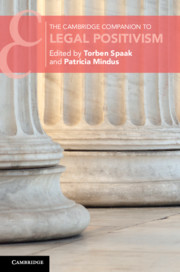Book contents
- The Cambridge Companion to Legal Positivism
- Cambridge Companions to Law
- The Cambridge Companion to Legal Positivism
- Copyright page
- Contents
- Figures
- Contributors
- Acknowledgements
- 1 Introduction
- Part I Fundamentals
- Part II History
- 5 The German Tradition of Legal Positivism
- 6 The French Tradition of Legal Positivism
- 7 The Italian Tradition of Legal Positivism
- 8 The British Tradition of Legal Positivism
- Part III Central Figures
- Part IV Main Tenets
- Part V Normativity and Values
- Part VI Critique
- Index
- References
7 - The Italian Tradition of Legal Positivism
from Part II - History
Published online by Cambridge University Press: 21 January 2021
- The Cambridge Companion to Legal Positivism
- Cambridge Companions to Law
- The Cambridge Companion to Legal Positivism
- Copyright page
- Contents
- Figures
- Contributors
- Acknowledgements
- 1 Introduction
- Part I Fundamentals
- Part II History
- 5 The German Tradition of Legal Positivism
- 6 The French Tradition of Legal Positivism
- 7 The Italian Tradition of Legal Positivism
- 8 The British Tradition of Legal Positivism
- Part III Central Figures
- Part IV Main Tenets
- Part V Normativity and Values
- Part VI Critique
- Index
- References
Summary
Guastini argues that legal positivism was first conceived as a type of legal philosophy by Norberto Bobbio in 1950, and that Bobbio later distinguished between methodological positivism, theoretical positivism and ideological positivism. For Bobbio, methodological positivism is a (normative) view about legal scholarship, namely, that it should be descriptive; that theoretical positivism is a substantive theory of law, according to which law is a set of commands issued by the sovereign, legal interpretation is a cognitive enterprise, and the application of law is a matter of deduction; that ideological positivism is the view that one ought to obey the law regardless of its content; and that all three types of legal positivism share the view that there is no such thing as natural law. As Guastini explains, contemporary Italian legal philosophers reject theoretical positivism and mostly conceive of legal positivism along methodological lines, holding that there is no natural law, that it is important to distinguish between expository and censorial jurisprudence (in Bentham’s terminology), and that there is no obligation to obey the law all things considered or regardless of the law.
- Type
- Chapter
- Information
- The Cambridge Companion to Legal Positivism , pp. 152 - 175Publisher: Cambridge University PressPrint publication year: 2021
References
- 2
- Cited by

